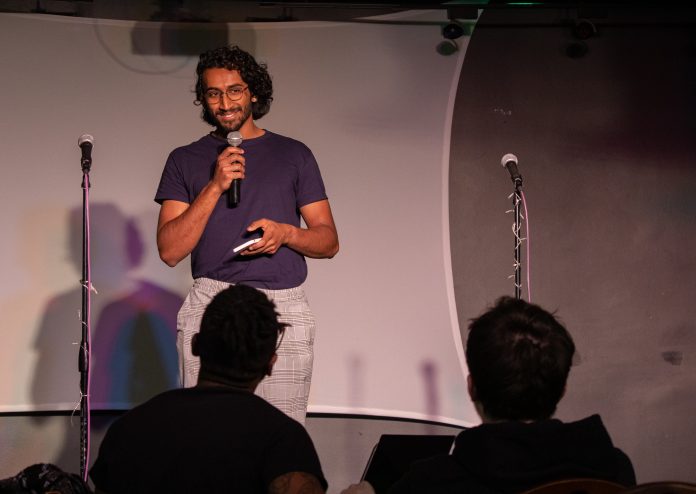Sunday, April 10, AMP, WMFIRE and Inside Out Theatre jointly hosted Dear White People, an open-mic night for students of color to highlight their experiences of being a minority at the College of William and Mary, a predominantly white institution. Students gathered in Sadler Center’s Lodge 1 as the lights dimmed, which, in this case, was not merely a perfunctory choice but a symbolic act of elevating marginalized voices in an environment that hasn’t always been welcoming to them.
Dear White People was inspired by the Netflix show of the same name, which depicts a group of Black students navigating implicit biases and growing pains at a fictional Ivy League university. Victoria Kim ’23, a co-host, explained that the parallels between Dear White People and the College were too stark to overlook.
“We were watching the Netflix show, and we were like, ‘you know what, Sam, the main character, talks about all of her experiences at a PWI,’ and I’m like, ‘this sounds really familiar,’” Kim said. “I really wanted something like that on this campus, so obviously, by the title, we wanted this event to be a platform for POC students to explain their experiences and uplift their voices. And there’s no ambiguity about who can speak and who can’t.”
The event kicked off with a speech called “Dear White People,” written by a group of people and delivered by Destiny Hodgson ’22, who ricocheted one item after another that encapsulated the complicated feelings that arise from attending a PWI.
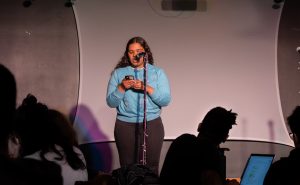
“Dear white people, why are you walking around campus with no shoes on? Dear white people, what is it about Taylor Swift that has y’all in a chokehold? Dear white people, do you know we don’t care that you’re legacy? Dear white people, what is it about my hair that’s so fascinating?” Hodgson said.
Her speech touched on inequities in the college admissions process to microaggressions, from performative activism to attitudes toward affirmative action policies. It set the tone for the rest of the event, making clear that people could safely share their vulnerable stories without fear of judgment or reprisal. Subsequently, the audience started to speak on otherwise taboo topics and let off some steam.
Students also gave longer speeches in which they dove into a topic that closely resonated with their lived experiences. Anshu Sharma, a first-year Ph.D. student, reflected on his immigrant parents’ strict expectations and how those expectations contributed to a rocky relationship he’s still trying to reconcile.
“I’m very grateful to my parents for helping finance things like Gradplex housing and the meal plan,” Sharma said. “That said, I have already told my parents that if I have a wedding, they’re not invited. It’s true. But let me make it clear. I think one thing that I want white people — frankly all people, and people of color as well — to know is that strict parenting, or parenting that puts the parents’ wishes above the child’s, is not limited to one race, one city, or one religion.”
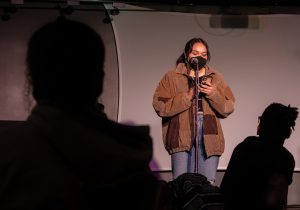
Co-host Isabella Ortiz-Miller ’23 talked about how her material circumstances as a first-generation, low-income student constrained her ability to experience the world. Once she arrived at the College, Ortiz-Miller became acutely aware of the harsh impacts of economic inequity.
“It may seem small, but I think if I had a yard with bird feeders and got to experience seeing all those chubby little birds flying around every day, I would fall in love,” Ortiz-Miller said. “And in my STEM classes, I learned that BIPOC live in drastically less biodiverse areas, there’s less green spaces and the air quality, especially in predominantly Black neighborhoods, is so much worse than white neighborhoods. Poor people don’t have the time, money or resources for outdoor recreation. We have to worry about so many other things so for you all to be able to enjoy nature at such a young age is a privilege.”
In addition to speeches, students also performed poetry to reflect on their intersecting identities vis-a-vis the political climate. Co-host Jason Dean Robinson ’22 described the fragility of Black men’s lives in a series of three poems. He explained that the first one centered on mental health awareness.
“Oftentimes, I think Black and brown men, mental health is incredibly neglected,” Robinson said. “We’re expected to be strong and masculine all the time. And so I want to dedicate this piece to all the black men who are suffering in silence.”
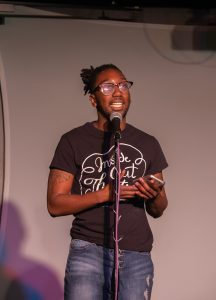
For over an hour, students continued sharing the stage to speak on pertinent social justice issues, and the event ultimately concluded on a note as strong as that of its opening. Asher Berwick ’23 took to the stage to deliver a strong rebuke of American apathy toward the Palestine crisis, emphasizing how Americans were quick to support domestic social justice causes but remained largely silent on international ones.
“Y’all be so quick to challenges racism at least publicly here in the states, but y’all are so silent and complicit to Israeli subjugation of Palestinian territory,” Berwick said. “And that’s really fucked up on so many levels.”
After the show, Berwick urged white students to actively seek out people from different backgrounds and get out of their privileged bubbles.
“White people usually only hang out with other white people 99% of the time, and how are you going to uplift POC when you don’t hang out with them?” Berwick said. “I don’t want white people to feel bad, but they just need to be more aware because they live with this happy ignorance.”
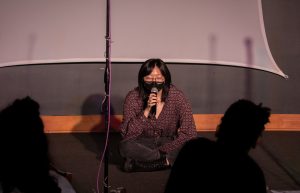
Kim talked about the cathartic release that her speech on grappling with the reality of being Asian American provided her.
“Honestly, after I spoke, I was shaking so much,” Kim said. “Being vulnerable like that in front of so many people and strangers is something I’ve never done. But seeing other people do it honestly made me so happy, and I know that there’s no growth or community without, and I’m happy to see it happen.
Robinson stressed the need for events such as these, even in the face of critics who say otherwise.
“I would want people to know that if you don’t think there’s a need for a space like this, there’s always a need for a space like this,” Robinson said.

